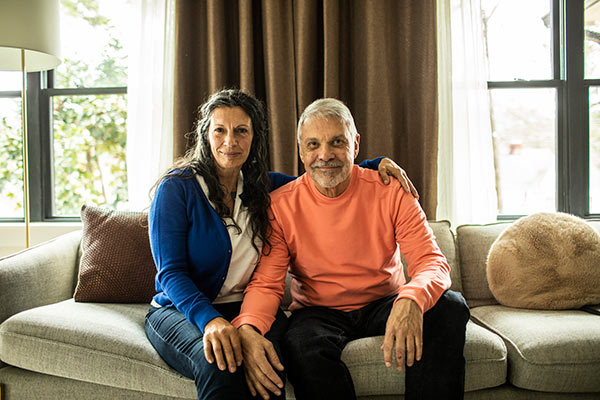Eight essential questions to ask your partner before you retire
You don’t necessarily have to be on the same page, but discussing your later-life preferences with your partner will make it easier to secure the retirement you both want, writes Rachel Lacey.
18th October 2023 09:58
by Rachel Lacey from interactive investor

It doesn’t matter how successful your relationship has been so far; retirement can be a challenge for even the strongest of couples. Your lifestyle will likely turn on its head, you might be spending a lot more time together and, without the security of a monthly salary, there will be new budgets and financial plans to get used to.
This can be even more challenging if there is an age gap between you, or you have different priorities. But by talking about what you want from your retirement and how you will manage your finances well before you finish work, it is possible to take much of the stress out of the transition.
- Invest with ii: SIPP Account | Stocks & Shares ISA | See all Investment Accounts
Get the process started with our guide to the conversations every couple needs to have before they retire.
1) When do you want to wind down from work?
Some people want to stop work altogether, as soon as they can afford to; others can’t imagine a life without it. Increasing numbers want to wind down gradually or carry on doing some paid work into their retirement years.
It doesn’t matter if you aren’t on the same page, or an age gap makes retiring together impossible, by talking about your preferences it will be easier to come up with a plan that works for you both.
2) What would you like our retirement lifestyle to look like?
It’s also helpful if you each understand how the other wants to spend their new-found spare time. Will work still be a feature, whether it’s on a paid or voluntary basis? Are there new hobbies you would like to explore? Do you want to travel or spend more time with your family?
It’s easy to make assumptions about how your partner will want to spend their time, but retirement can present a fantastic opportunity to shake your life up a bit, if that’s what you want.
3) Do you want to stay in our existing home?
One way of shaking your life up a bit is by moving home – you don’t have to stay in the house you’ve lived in for years. Downsizing somewhere smaller could free up some much-needed money and make your retirement years more comfortable. Alternatively, you might want to move closer to children and grandchildren, or crave a fresh start somewhere altogether different.
This one can be harder to manage if you’ve got conflicting views, but by talking it through it will be easier to arrive at a compromise.

4) How much financial support should we give our kids?
For couples with kids, this can be a major bone of contention. While one of you might really want to help with house deposits, weddings, and grandchildren, the other might prefer the two of you to enjoy your spoils. It can be even more complicated if either, or both of you, has children from a previous relationship.
But even if you’re both in agreement, and no concessions are needed, you will still need to factor the money you want to give them into your financial plan.
And, while you are on the subject of kids, you should also discuss how important it is to leave an inheritance as this could have a major impact on your retirement spending.
5) What financial things do you worry about?
However much you might be looking forward to your retirement, it often comes with some anxieties too, so it makes sense to discuss your worries together.
Running out of money, or how your partner will get by if you die first, are both common concerns. You might also be worried about your children, your parents, or what you will do if you or your other half’s health deteriorates.
6) How much income will we need?
Once you’ve had these discussions, and have a clearer idea of your priorities and concerns, you will both be in a much better position to start visualising your retirement and thinking about money.
Exactly how much you will need to live off will vary according to where you live and what you have planned, but if you’re not planning any major lifestyle changes, a comfortable target might be around two-thirds of your pre-retirement income.
In addition to just covering the bills, make sure you are allowing for the cost of filling your time and balance it out with earnings from work if you are having a phased retirement. It’s also an idea to factor in potential unforeseen costs, such as work on the house.
If closer analysis suggests you might be able to raise the income you need, now’s the time to start planning a workaround. If time is on your side, you might be able to save more for retirement. Or you might want to review when you retire, or whether there might be other, more imaginative ways to boost your income.
7) Where will our income come from?
The answer to this question will be more complicated than simply your “pension”. Your income in retirement can come from a number of sources.
In addition to the state pension and private pensions, you might also have investments or property that can help fund your retirement income. You might work in some capacity as well – whether that’s a move to part-time work or new retirement side hustle such as house-sitting or dog walking.
Depending on your circumstances, there may be an argument for leaving your pension untouched for as long as you can. That’s because any money left in pensions when you die can be paid to your loved ones, free of inheritance tax (as your pension is not considered part of your estate).
- Nine tips to get an A* in IHT planning
- Could your pension be the solution to your inheritance tax woes?
As your pension income will be taxable, you might also want to think about spending other investments first. You could, for example, take a tax-free income from ISAs instead. Or you could use a combination of pensions and ISAs – taking pension income up to the personal allowance and topping that up with money from your ISA. This could mean you might not have to pay any tax on your retirement income at all.
8) What should we do with our pensions?
When you do start taking an income from your pension, you will also need to agree the best way to go about it.
Drawdown allows you to control your income and, as your money remains invested, there’s potential for further growth. However, there is a risk that you will run out of money.
With an annuity, your income would be guaranteed, and rising interest rates mean they have started looking more attractive. But it’s important to note that your income will be fixed at outset, and you won’t be able to tweak it over time as your needs change. And, while you can set up joint-life plans, you won’t be able to leave any remaining funds to children or other family members once you have both died, unless you buy additional protection.
Working out the best approach can be tricky, especially if you have different attitudes to risk or one of you is more financially confident.
If you do struggle to agree it can be helpful to invest in financial advice, even if you’ve managed without it so far. A good financial adviser can help by taking emotion out of the process – they will listen to you both and come up with a retirement income plan that works for each of you, using multiple options if necessary.
They will also make sure your plans are as tax effective as possible. There could be lots of tax-saving opportunities to work with, especially if one of you is a taxpayer and the other is not.
These articles are provided for information purposes only. Occasionally, an opinion about whether to buy or sell a specific investment may be provided by third parties. The content is not intended to be a personal recommendation to buy or sell any financial instrument or product, or to adopt any investment strategy as it is not provided based on an assessment of your investing knowledge and experience, your financial situation or your investment objectives. The value of your investments, and the income derived from them, may go down as well as up. You may not get back all the money that you invest. The investments referred to in this article may not be suitable for all investors, and if in doubt, an investor should seek advice from a qualified investment adviser.
Full performance can be found on the company or index summary page on the interactive investor website. Simply click on the company's or index name highlighted in the article.